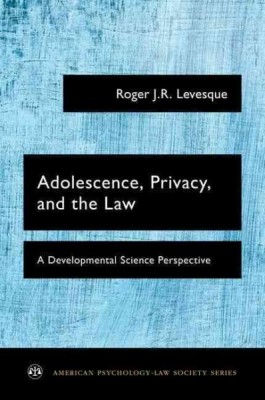| Adolescence, Privacy, and the Law: A Developmental Science Perspective Contributor(s): Levesque, Roger J. R. (Author) |
|
 |
ISBN: 0190460792 ISBN-13: 9780190460792 Publisher: Oxford University Press, USA OUR PRICE: $87.40 Product Type: Paperback - Other Formats Published: August 2016 |
| Additional Information |
| BISAC Categories: - Psychology | Forensic Psychology - Psychology | Developmental - Adolescent - Political Science | Civil Rights |
| Dewey: 323.448 |
| LCCN: 2016018964 |
| Physical Information: 0.6" H x 6.1" W x 9.1" (0.75 lbs) 232 pages |
| Descriptions, Reviews, Etc. |
| Publisher Description: Adolescence, Privacy, and the Law provides a foundation for understanding privacy rights and how they relate to adolescents. Roger Levesque argues that because privacy is actually an inherently social phenomenon, the ways in which adolescents' privacy needs and rights are shaped are essential to society's broader privacy interests. A close look at empirical understandings of privacy, how it shapes development, and how privacy itself can be shaped provides important lessons for addressing the critical juncture facing privacy rights and privacy itself. Adolescence, Privacy, and the Law provides an overview of the three major strands of privacy rights: decisional, spatial, and informational, and extends current understandings of these strands and how the legal system addresses adolescents and their legal status. Levesque presents comprehensive and specific analyses of the place of privacy in adolescent development and its outcomes, the influences that shape adolescents' expectations and experiences of privacy, and ways to effectively shape adolescents' use of privacy. He explains why privacy law must move in new directions to address privacy needs and pinpoints the legal foundation for moving in new directions. The book charts broad proposals to guide the development of sociolegal responses to changing social environments related to the privacy of adolescents and challenges jurisprudential analyses claiming that developmental sciences do not offer important and useful tools to guide responses to adolescents' privacy. Lastly, Levesque responds to likely criticisms that may hamper the development of sociolegal stances more consistent with adolescents' needs for privacy as well as with societal concerns about privacy. |